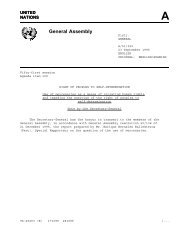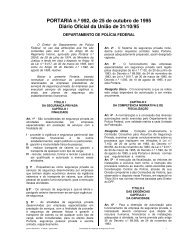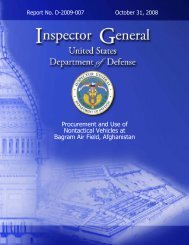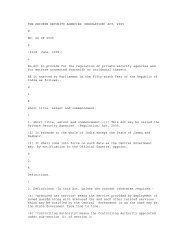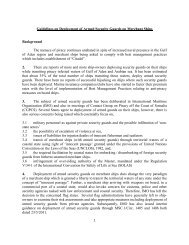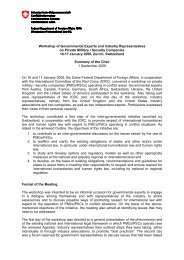Security Assistance; and Logistics - Federation of American Scientists
Security Assistance; and Logistics - Federation of American Scientists
Security Assistance; and Logistics - Federation of American Scientists
Create successful ePaper yourself
Turn your PDF publications into a flip-book with our unique Google optimized e-Paper software.
investigate the practicality <strong>and</strong> long-term benefit <strong>of</strong> instituting the NATO system in Iraq,both through the MoD <strong>and</strong> MoI, to st<strong>and</strong>ardize the Iraqi materiel management efforts.Iraqi Army Personnel for Class IX Parts ManagementThere was an insufficient number <strong>of</strong> trained <strong>and</strong> qualified soldiers available to assume theresponsibility for parts management. This was evident at Taji National Depot <strong>and</strong> atKMTB. The shortages in Iraqi Army personnel were particularly acute among NCOs <strong>and</strong>Warrant Officers, as well as enlisted personnel. Taji had not hired civilians to performthe maintenance or parts support mission. Table 3 below shows the manning for TajiNational Depot at the time <strong>of</strong> our visit.Table 3. Manning for Taji National Depot, May 2008Officers NCOs Junood CiviliansAuthorized 38 409 464 55On H<strong>and</strong> 33 80 294 0Trained 33 70 290 0(Source: Comm<strong>and</strong>er Taji National Depot Briefing to DoDIG Assessment Team, May 8, 2008)Training for Iraqi Army personnel in maintenance <strong>and</strong> parts management has beendeficient. A senior <strong>of</strong>ficial in the Joint Headquarters indicated that the best trainingprovided thus far only made a new recruit an apprentice mechanic. There weresignificant shortages in NCOs <strong>and</strong> Warrant Officers to supervise <strong>and</strong> develop apprenticemechanics.According to a senior Iraqi Army <strong>of</strong>ficial from the IASSI, one problem hampering thetraining <strong>of</strong> logisticians for the Iraqi military was illiteracy. At least 25 percent <strong>of</strong> thestudents who reported for each course were turned away because they were illiterate inArabic <strong>and</strong> therefore incapable <strong>of</strong> reading the required manuals. This included studentsfrom Kurdish provinces who, though literate in Kurdish, could not read, write, or speakArabic. Through April 2008, IASSI had trained 2460 soldiers in the Supply <strong>and</strong>Warehouse course, but there was no course on parts requisitioning <strong>and</strong> monitoring.The new director <strong>of</strong> Electro-Motive Equipment Branch 30 in the Joint Headquartersinitiated a request, signed by the Iraqi Deputy Chief <strong>of</strong> Staff for <strong>Logistics</strong>, asking for aLetter <strong>of</strong> Request through FMS to provide 22-24 contracted personnel for partsdistribution <strong>and</strong> management at Taji National Depot, <strong>and</strong> for the contractor to providetraining to IA personnel on this issue. At the time <strong>of</strong> our visit, the Secretary General tothe MoD had not yet signed the FMS letter <strong>of</strong> request.Information SystemsAt both Taji <strong>and</strong> KMTB Location Comm<strong>and</strong>s, the contractor h<strong>and</strong>ling the nationalmaintenance contract had an electronic database system in place to track storage,30 The Electro-Motive Branch, under the JHQ Deputy Chief <strong>of</strong> Staff for <strong>Logistics</strong>, oversees the LocationComm<strong>and</strong>s, <strong>and</strong> therefore, the vehicle maintenance <strong>and</strong> repair parts processes.118





